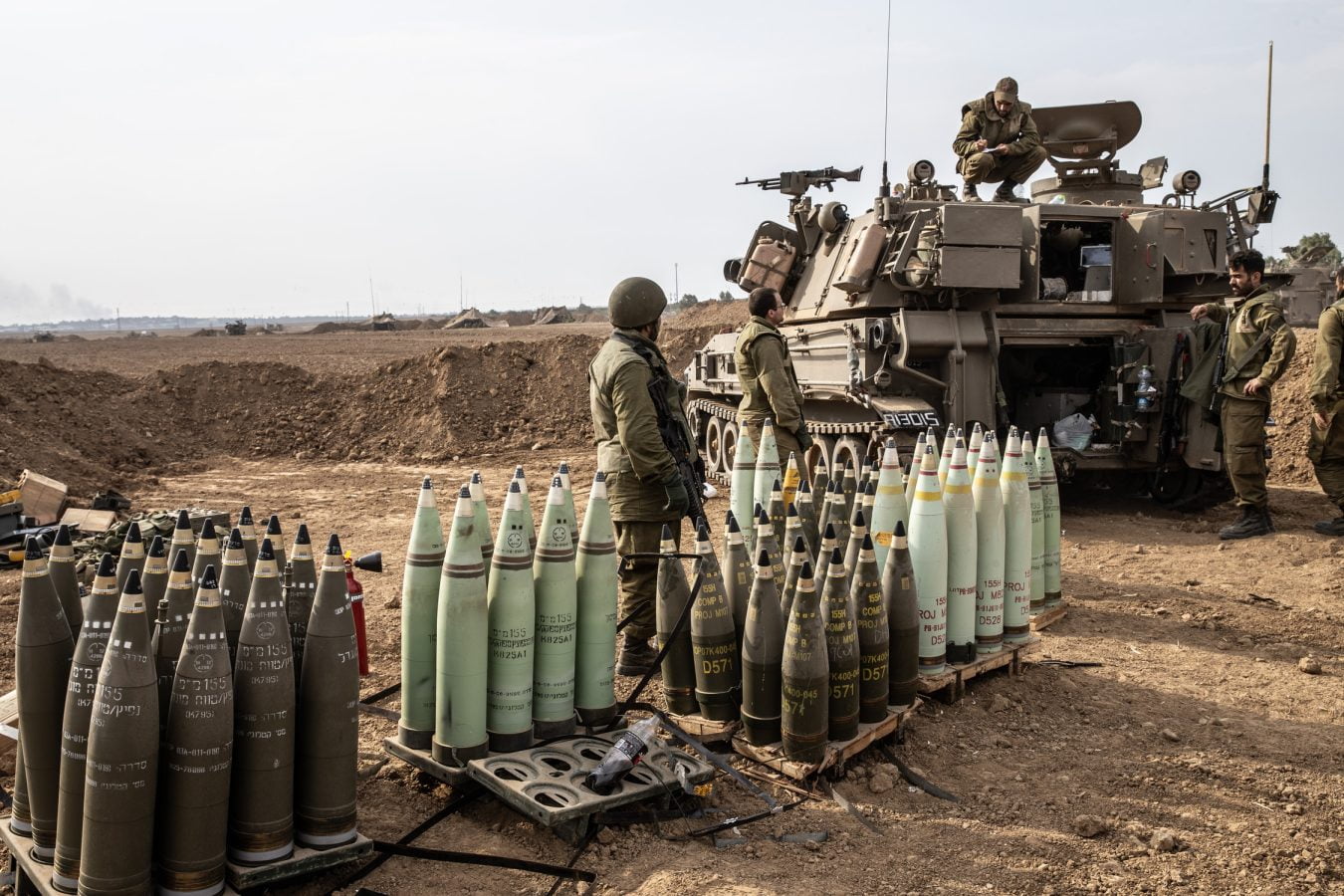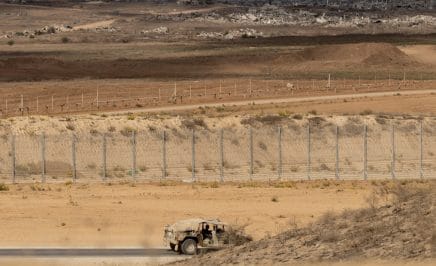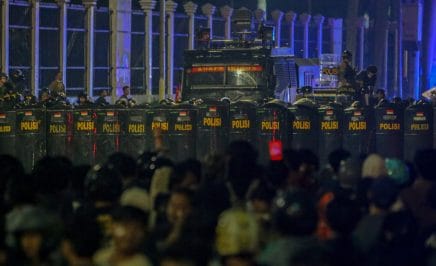- Arms Trade Treaty adopted over 10 years ago
- Amnesty International continues to expose unlawful arms transfers that facilitate grave abuses
- Flouting of rules is leading to devastating loss of life in conflict zones
- Amnesty International call into questions Australia’s compliance with ATT, raises concerns about ammunition manufacturer Thales
Some of the world’s biggest arms exporters are continuing to openly flout the rules of the Arms Trade Treaty through unlawful arms transfers, leading to a devastating loss of life in conflict zones such as the Occupied Palestinian Territory, in particular the occupied Gaza Strip, Sudan and Myanmar, said Amnesty International over ten years on from the treaty’s adoption.
Since the Arms Trade Treaty entered into force almost a decade ago, Amnesty International has continued to document and expose unlawful arms transfers that facilitate grave abuses, contravening the robust, legally-binding, global rules on international arms transfers the treaty established. On 2 April 2013, a total of 155 states voted to adopt the Arms Trade Treaty. Today, the treaty has 115 state parties and 27 signatories, including all of the top 10 arms exporters – which account for over 90% of the arms trade – except Russia.
“The Arms Trade Treaty is the first of its kind to set global standards to govern the international trade in conventional arms and munitions. The legality of an arms transfer is now explicitly linked to international human rights and humanitarian law rules,” said Patrick Wilcken, Amnesty International’s Researcher on Military, Security and Policing.
“Although progress has been achieved, numerous governments continue to brazenly flout the rules, leading to a huge loss of life in conflict zones. It is time for state parties to live up to their legal obligations and fully implement the Arms Trade Treaty, to prohibit the flow of arms to countries when it is known they would be used for genocide, crimes against humanity, war crimes or if it could be used to commit or facilitate serious violations of international human rights or humanitarian law.”
Amnesty International call into questions Australia’s compliance with ATT
Amnesty International Australia has major concerns regarding Australia’s compliance with the ATT and the onward sale of weapons, weapon parts and ammunition/munitions from Australian businesses to the Israeli military via intermediate countries.
While it is correct to say that Australia has not directly exported weapons to Israel since October 7th 2023, Amnesty International has serious concerns as to Australia’s adherence to both the spirit and letter of the ATT, with Australian-made weapons parts and munitions possibly used by the Israeli military.
Australia’s opaque defence export system makes it impossible for journalists or human rights organisations to confirm exactly what Australia is sending overseas, and to whom. However, Amnesty International Australia believes it likely that Thales Australia, who manufacture TNT for 155mm artillery ammunition shells out of Benalla in Victoria, as well as completed M795 155mm projectiles, provide these to the US through approved defence export permits.
In December 2023 a $147.5 million export permit from the US to Israel for 155mm shells was approved. Part of this permit was M795 155mm shells, which are the same kind manufactured by Thales in Benalla, meaning that Australian manufactured ammunition/munitions might be being used by the Israeli Defence Force in Gaza.
Amnesty International argues that under Australia’s obligations under the ATT and given the publicly available information, any export permits to the US for ammunition/munitions manufactured by Thales or any other company should have, and should continue to be, rejected, pending legally-binding assurances that these items will not be re-exported to Israel.
In the absence of a UN Security Council arms embargo, Amnesty International is calling on the Australian Government to immediately impose a comprehensive national arms embargo on Israel, Hamas and other armed groups until there is no longer a substantial risk that arms could be used to commit or facilitate serious violations of international human rights or humanitarian law; and effective accountability mechanisms are in place.
Crucially, Amnesty International also urges the Australian government to adopt a transparent national control system which provides as much up-to-date and publicly-accessible information as possible on the quantity, type, dollar value, final destination, end user and end use of all military and dual use equipment and munitions, including parts and components.
The ATT was designed to stop deadly weapons from getting into the hands of people who will use them to commit serious human rights violations, including genocide, crimes against humanity and war crimes. Australia signed the ATT at New York on 3 June 2013 and ratified it on 3 June 2014.
Unlawful arms transfers to Israel
The continued transfer or arms to Israel is a stark example of the failure by state parties to fully comply with the Arms Trade Treaty, or, regarding signatories, not undermine its object and purpose.
“Amnesty International has long been calling for a comprehensive arms embargo on both Israel and Palestinian armed groups because of longstanding patterns of serious violations of international human rights and humanitarian law, including war crimes, leading to horrific impacts on civilians, including women and children,” said Patrick Wilcken.
“States parties and signatories, including the USA – the largest provider of arms to Israel – continue to licence arms transfers to Israel in spite of overwhelming evidence of war crimes committed by Israeli forces.”
For example, Amnesty has documented the use of US-manufactured weapons in a number of unlawful airstrikes, including US-made Joint Direct Attack Munitions (JDAM) in two deadly, unlawful air strikes on homes in the occupied Gaza Strip, which killed 43 civilians – 19 children, 14 women and 10 men – on 10 and 22 October 2023.
A GBU-39 Small Diameter Bomb, made in the US by Boeing, was used in an Israeli strike in January 2024 which hit a family home in the Tal al-Sultan area of Rafah, killing 18 civilians, including 10 children, four men, and four women.
Illegal arms trade fuels unrest in Sudan
Illegal arms transfers have also fuelled unrest in Sudan. Since the escalation of the conflict in April 2023, Sudan has been engulfed in a massive human rights and humanitarian crisis. The fighting between the Sudanese Armed Forces (SAF) and the Rapid Support Forces (RSF) and their allies has killed more than 16,650 people and displaced millions of others, making Sudan the world’s largest internal displacement crisis.
Despite this crisis, and a UN Security Council arms embargo on the Darfur region, Amnesty International continues to document substantial flows of weapons into the conflict. Amnesty International has identified recently-manufactured weapons and military equipment from countries such as China and Serbia, who are state parties to the Arms Trade Treaty, and signatories Türkiye and the United Arab Emirates (UAE), that are being imported in large quantities into Sudan, and then in some cases diverted into Darfur, fuelling the violence.
Myanmar imports at least $1 billion USD in arms
According to the Special Rapporteur on the situation of human rights in Myanmar, the military has imported at least $1 billion USD in arms, dual-use goods, equipment, and raw materials to manufacture weapons – including from China – since it initiated a military coup in February 2021.
“The Myanmar military has used these weapons to repeatedly attack civilians and civilian objects – often destroying or damaging schools, religious buildings and other key infrastructure – in the three years since carrying out a coup,” said Patrick Wilcken.
Moving forward
Since the early 1990s, Amnesty International has been campaigning with NGO partners to achieve robust, legally binding global rules on international arms transfers to stem the flow of arms that fuel atrocities, yet more needs to be done to ensure this treaty is upheld to stop further bloodshed.
“Too many lives have been lost to these dangerous weapons. State parties and signatories to the Arms Trade Treaty cannot afford to shirk their obligations any longer,” said Patrick Wilcken. “As the Arms Trade Treaty nears the 10-year anniversary of its entry into force, states must stand true to the treaty and reduce human suffering now.”









